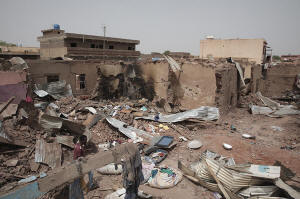UN official calls for more attention to Sudan’s 'forgotten' war amid
fresh atrocities
 Send a link to a friend
Send a link to a friend
 [October 26, 2024]
By SAMY MAGDY [October 26, 2024]
By SAMY MAGDY
CAIRO (AP) — A senior United Nations official on Friday called for more
international attention to “the forgotten crisis” in Sudan, where more
than a year and a half of war pushed the African country to the brink of
famine.
The appeal by Ted Chaiban, deputy head of the U.N. children's agency
UNICEF, came as the notorious paramilitary Rapid Support Forces rampaged
through villages and towns in east-central Gezira province, looting and
vandalizing public and private properties, according to a doctors’ union
and a youth group. Dozens of people were reported killed.
Chaiban said the war, which erupted in April 2023 between the military
and the RSF, created “one of the most acute crises in living memory”
with more than 14 million people forced to flee their homes, making
Sudan the world’s largest displacement crisis.
“We’ve never in a generation seen these types of numbers,” he told The
Associated Press in an interview, referring to the displaced people, as
well as the 8.5 million people who are facing emergency levels of food
insecurity, and 775,000 others who are facing famine-like conditions.
“The whole country has been dislocated,” he said. “And yet, despite
that, the country and the crisis is forgotten.”

The war came four years after a pro-democracy uprising forced the
military’s ouster of the country’s longtime dictator Omar al-Bashir that
was followed by a short-lived transition to democracy. It has killed
more than 24,000 people so far, according to the Armed Conflict Location
and Event Data, a group monitoring the conflict since it started.
Chaiban spoke to the AP after he and Raouf Mazou, assistant high
commissioner for operations at the U.N. refugee agency, UNHCR, visited
eastern Sudan earlier this week. They met with local authorities and
visited displaced people in a sprawling camp hosting over 4,000 people
in the eastern province of Kassala.
They called for unimpeded access to people in need across the country,
and advocated for more global attention to what Chaiban described as
“one of the critical generational crises we’re facing.”
Global attention has been shifted to the Middle East since the militant
group Hamas launched its attack on southern Israel in October last year,
triggering a war that has killed about 42,000 people in Gaza. The health
ministry in Hamas-run Gaza does not differentiate between militants and
civilians but say more than half of the dead were women and children.
Hamas' attack killed about 1,200 people in Israel, mostly civilians.
Now, international efforts are focusing on the Israel-Hezbollah war in
Lebanon amid mounting concerns about a regional war between Israel and
Iran.
“We have done everything to respond to the war in Gaza and the war in
Lebanon. … Sudan also needs this level of attention,” he said.
[to top of second column]
|

A man walks by a house hit in recent fighting in Khartoum, Sudan, an
area torn by fighting between the military and the notorious
paramilitary Rapid Support Forces, April 25, 2023. (AP Photo/Marwan
Ali, File)

The Sudanese military has been pursuing a major offensive since
September to retake RSF-controlled areas in and around the capital,
Khartoum. The military also earlier this month captured Jebel Moya,
a strategic mountainous area in Gezira province, in a major setback
for the RSF, which also lost other areas in Gezira and nearby Sinnar
province.
Also in October, a top RSF commander, Abu Aqlah Keikel, the de facto
ruler of Gezira province, defected and surrendered himself to the
military.
Local media reported that Keikel’s surrender was a coordinated
operation. The military said in a statement that Keikel had “decided
to fight alongside our army, abandoning the lines of the rebels
after discovering the falsehood of the claims of the terrorist
Dagalo militia.”
The RSF, which is led by Gen. Mohamed Hamdan Dagalo, downplayed
Keikel’s defection. The commander had supported the military at the
beginning of the war but switched sides in August last year,
according to the Sudan War Monitor, a group tracking the conflict.
RSF fighters were furious and went on a rampage through multiple
towns and villages east and north of Gezira, as well as the city of
Tamboul, killing dozens of civilians and displacing thousands of
others.
In one town, Sariha, RSF fighters killed at least 50 people and
wounded 200 others, according to the Resistance Committees, a
network of youth groups tracking the war. In the village of Saqiaah,
at least 12 people were killed, it said.
The Doctors' Union in Sudan on Thursday said the RSF attacks turned
areas in eastern Gezira into “a brutal war zone.”
RSF fighters have committed “systemic sexual crimes, burned houses
and properties, and attacked health care facilities along with
systemic looting and forced displacement,” the union said in a
statement on Thursday.
The war has been marked by atrocities such as mass rape and
ethnicity motivated killings. The United Nations and international
rights groups say these acts amount to war crimes and crimes against
humanity, particularly in the western region of Darfur, which has
been facing a bitter onslaught by the RSF.
The conflict pushed the country to the brink of famine, which was
already confirmed in July in the Zamzam camp for displaced people,
which is located about 15 kilometers (9 miles) from North Darfur’s
embattled capital of al-Fasher, according to global experts from the
Famine Review Committee. About 25.6 million people — more than half
of Sudan’s population — are expected to face acute hunger this year,
they warned.
All contents © copyright 2024 Associated Press. All rights reserved
 |